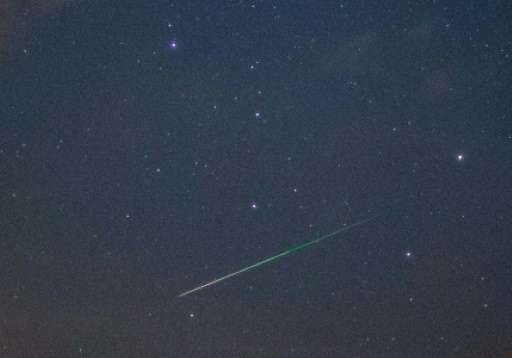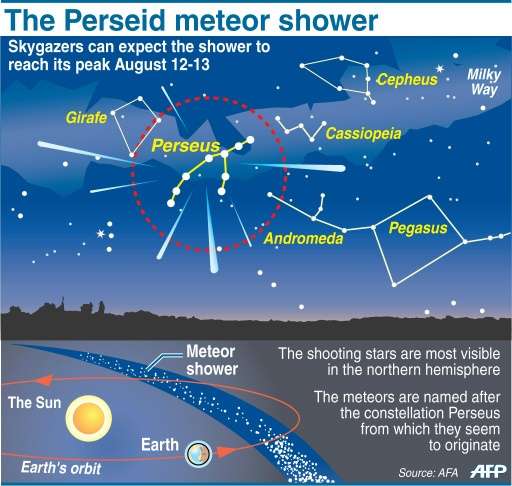Spectacular meteor shower set to light up UK skies

A spectacular display of hundreds of shooting stars are expected to be visible in the skies across parts of the UK late on Wednesday as the annual Perseid meteor shower reaches its peak.
Skywatchers in the Midlands and the north of England are set to have the best view of the celestial event but visibility is set to be limited in southern areas and Scotland because of cloud cover.
The natural display—visible around the globe—is expected to be particularly vibrant this year as the meteors' arrival coincides with a new Moon, with extra-dark skies expected to create optimal viewing conditions.
"It's going to be a spectacular show this year," Morgan Hollis of the Royal Astronomical Society told AFP. "You'll be able to a see a lot more than normal."
Professor Mark Bailey, director of Armagh Observatory in Northern Ireland, said the Perseids were the "best and most reliable meteor showers of the year".
Bailey said the shower—named after the constellation of Perseus from which they appear to fly out—was expected to produce an initial outburst of activity around 7.40pm.
At its peak at 11.00pm as many as 100 meteors are due to be visible every hour.
The Perseids meteors are tiny particles of ice and dust shed from the comet Swift-Tuttle, which swings around the Solar System every 130 years or so, depositing debris in Earth's orbit as it nears the Sun.
International Space Station

The particles smash into the Earth's atmosphere at about 60 kilometres (37 miles) per second, burning up in flashes of light and causing a characteristic streak of light.
Occurring every year between mid-July and mid-August, this year's Perseid shower is due to be joined by the twinkle of the International Space Station (ISS), which is expected to be visible for four minutes from 10.28pm.
"The thing about shooting stars is they're a wonderful free spectacle we can all enjoy, assuming clear skies," said Robin Scagell, vice-president of the Society for Popular Astronomy.
"It's best to watch them from the countryside but even in town, these meteors are bright enough for a few to be visible.
"They tend to leave a trail, or train, behind them. You can see the train hanging there glowing in the sky for a few seconds—sometimes for several minutes—after the meteor has gone."
© 2015 AFP


















